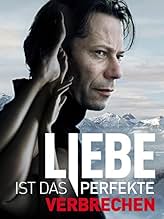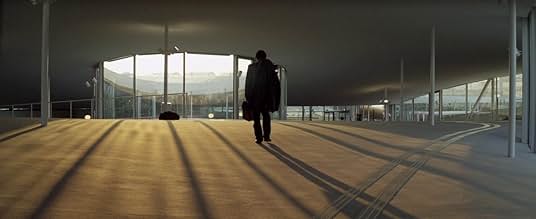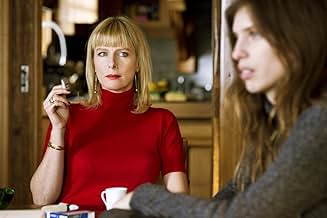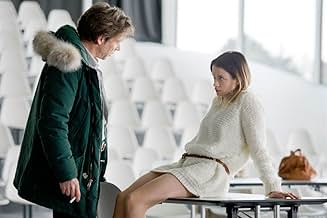L'amour est un crime parfait
- 2013
- 1h 50min
CALIFICACIÓN DE IMDb
5.8/10
2.2 k
TU CALIFICACIÓN
Después de un breve romance con su seductor profesor, una joven estudiante desaparece misteriosamente. La policía y la madrastra de la niña estrechan el cerco al enigmático tutor.Después de un breve romance con su seductor profesor, una joven estudiante desaparece misteriosamente. La policía y la madrastra de la niña estrechan el cerco al enigmático tutor.Después de un breve romance con su seductor profesor, una joven estudiante desaparece misteriosamente. La policía y la madrastra de la niña estrechan el cerco al enigmático tutor.
- Dirección
- Guionistas
- Elenco
- Premios
- 2 nominaciones en total
Carl von Malaisé
- Le policier à moto
- (as Carl von Malaise)
Alain Börek
- Le collègue de Marc
- (as Alain Borek)
- Dirección
- Guionistas
- Todo el elenco y el equipo
- Producción, taquilla y más en IMDbPro
Opiniones destacadas
A magnificent and intoxicating serial killer film set in the icy landscapes of Switzerland. Everything revolves around Marc, a sensualist and disturbed literature professor. His extremely literary way of expressing himself is undoubtedly impossible to apply in real life, but verisimilitude is not necessary. His intensity is fabulous, especially the way he looks at women, the way he fills his eyes and mind with them. Mathieu Amalric is just fantastic in this role. Note the excellent music of Caravaggio, subtle electronic tracks which embrace the rounded modernity of the university where Marc works. The Larrieu brothers once again excel in maintaining a floating and uncertain spirit in the film, whose main character gradually, almost voluptuously, loses his footing. Wonderful.
'Love is the Perfect Crime' ('L'amour est un crime parfait' in French) is one of the most formidable movie titles I can remember. A title that promises a combination of thriller and love story, which is indeed part of what the 2013 film directed by brothers Arnaud and Jean-Marie Larrieu proposes. The presence in the main role of Mathieu Amalric, one of my favorite French actors, heightened my curiosity to see this film. Of the many promises, only a part were justified.
Switzerland at the end of winter is the setting for the film. The snow-covered mountains represent since Hitchcock a scenery for films in the psychological thriller genre, with sunshine illuminating postcards landscapes behind which we can feel the threat, with snow covering tracks, traces and sometimes bodies, at least until the thaw. We deal with a plot in which part of the truth is hidden from viewers, which is a rule in most detective movies, but in this case the truth is hidden also to the heroes on the screen. Ambiguity is what characterizes their characters and feelings in this film. We are dealing with a criminal investigation (a student has disappeared and her teacher, a man with a fame of conqueror is one of the suspects) and with a late love story, but the reality behind the appearances is questionable to the very end.
What I liked: The role of Marc, the teacher of literary creation around which orbit the female students, but who is secretly haunted by his own traumas is perfect for Mathieu Amalric, who dominates the screen and the story with his feelings and dilemmas. The film is made 2-3 years before the 'me too' scandals broke out and the role would probably have been written differently if the film had been made now. The atmosphere of the Swiss university intellectual circles with their professional and romantic intrigues is very well rendered. The image is stylish and consistent. What I liked least: There are three women characters around Marc and the actresses' creations are uneven. If the interpreters of Marianne (Marc's sister - Karin Viard) and Annie (the student trying to lure Marc into a love affair - Sara Forestier) are neutral, Anna's key character is missed by Maïwenn's interpretation. The script suffers from a certain verbosity that makes the film seem long and repetitive from time to time. The ambiguity of the approach ultimately turns against the intentions of the filmmakers, and many viewers will already have been lost interest in the denouement by the end of the movie. Yet another proof that the performance of one single actor, no matter how good he may be, cannot sustain alone an entire movie.
Switzerland at the end of winter is the setting for the film. The snow-covered mountains represent since Hitchcock a scenery for films in the psychological thriller genre, with sunshine illuminating postcards landscapes behind which we can feel the threat, with snow covering tracks, traces and sometimes bodies, at least until the thaw. We deal with a plot in which part of the truth is hidden from viewers, which is a rule in most detective movies, but in this case the truth is hidden also to the heroes on the screen. Ambiguity is what characterizes their characters and feelings in this film. We are dealing with a criminal investigation (a student has disappeared and her teacher, a man with a fame of conqueror is one of the suspects) and with a late love story, but the reality behind the appearances is questionable to the very end.
What I liked: The role of Marc, the teacher of literary creation around which orbit the female students, but who is secretly haunted by his own traumas is perfect for Mathieu Amalric, who dominates the screen and the story with his feelings and dilemmas. The film is made 2-3 years before the 'me too' scandals broke out and the role would probably have been written differently if the film had been made now. The atmosphere of the Swiss university intellectual circles with their professional and romantic intrigues is very well rendered. The image is stylish and consistent. What I liked least: There are three women characters around Marc and the actresses' creations are uneven. If the interpreters of Marianne (Marc's sister - Karin Viard) and Annie (the student trying to lure Marc into a love affair - Sara Forestier) are neutral, Anna's key character is missed by Maïwenn's interpretation. The script suffers from a certain verbosity that makes the film seem long and repetitive from time to time. The ambiguity of the approach ultimately turns against the intentions of the filmmakers, and many viewers will already have been lost interest in the denouement by the end of the movie. Yet another proof that the performance of one single actor, no matter how good he may be, cannot sustain alone an entire movie.
When I have seen the good actresses and actors with a great backbround, I really thought this movie would be a good thriller.
And unfortunately, such a movie is a really a shame for these well-known actors.
I was completely bored all along.
And unfortunately, such a movie is a really a shame for these well-known actors.
I was completely bored all along.
At one point in this movie, the protagonist, a creative writing college professor (Matthieu Americ) with a taste for his nubile female students, gives a creative writing exercise where he tells students to write something based, not on character or story, but on a "landscape". That's kind of what this movie itself is. The plot and characters are definitely very serviceable with the professor suspected of being behind the disappearance of a female student he is seen in the carnal company of at the beginning, and neither the viewer or the perhaps the protagonist himself (who is given to severe "headaches") really sure of his guilt. Instead of being the usual married French cad though, the professor lives in an isolated mountain villa in a rather incestuous relationship with his sister (Karen Viard), who might be propping up his career via her sexual relationship with the college dean. Meanwhile, the suspicions swirling around don't stop him from getting sexually involved with the missing girl's alluring stepmother (Maiwenn LeBesco) or being pursued by the hot-to-trot daughter of a big university donor (Sara Forestier), who wants him to give her "private lessons" in, uh, creative writing.
This movie though, despite being basically a TV film, really benefits the most from its great "landscape". It is set in a wintry French alpine village and has great crisp cinematography (I don' know if it's digital, but if so digital has come a LONG way). The natural beauty is well matched by the incredible modern glass architecture of the mountain college where a lot of this takes place. Besides having the most beautiful female students I've ever seen, the professor also teaches in probably the nicest classroom that ANY creative writing professor has ever taught in.
Americ is definitely a talented and charismatic actor, who is very big in French film and has even left France to play James Bond villains. He manages to make his coed-molesting--and possibly murderous--anti-hero genuinely likable. But the OTHER part of the gorgeous "landscape" here frankly is the sumptuous female bodies on display. Sara Forstier is so irresistibly sexy that it beggars belief that the professor even tries. Maiwen LeBesco is also really something. It IS pretty funny though that she seems to be the only French actress I know of to use a "body double" for nude scenes given that her little sister, the equally voluptuous actress Isild LeBesco, only leaves her clothes ON in a movie if it's absolutely necessary to the plot (maybe Isild is her older sister's "body double"?). Although she's more famous (largely as the result of her shotgun teen wedding to director Luc Besson and appearances in a number of his films), I've never personally thought Maiwenn was nearly as talented as her sister, but she's really good here.
I don't want to take anything away from Americ or the very decent (if not always believable) story, but it is the "landscape--of natural scenery, modern architecture, and, yes, female flesh--that real makes this movie.
This movie though, despite being basically a TV film, really benefits the most from its great "landscape". It is set in a wintry French alpine village and has great crisp cinematography (I don' know if it's digital, but if so digital has come a LONG way). The natural beauty is well matched by the incredible modern glass architecture of the mountain college where a lot of this takes place. Besides having the most beautiful female students I've ever seen, the professor also teaches in probably the nicest classroom that ANY creative writing professor has ever taught in.
Americ is definitely a talented and charismatic actor, who is very big in French film and has even left France to play James Bond villains. He manages to make his coed-molesting--and possibly murderous--anti-hero genuinely likable. But the OTHER part of the gorgeous "landscape" here frankly is the sumptuous female bodies on display. Sara Forstier is so irresistibly sexy that it beggars belief that the professor even tries. Maiwen LeBesco is also really something. It IS pretty funny though that she seems to be the only French actress I know of to use a "body double" for nude scenes given that her little sister, the equally voluptuous actress Isild LeBesco, only leaves her clothes ON in a movie if it's absolutely necessary to the plot (maybe Isild is her older sister's "body double"?). Although she's more famous (largely as the result of her shotgun teen wedding to director Luc Besson and appearances in a number of his films), I've never personally thought Maiwenn was nearly as talented as her sister, but she's really good here.
I don't want to take anything away from Americ or the very decent (if not always believable) story, but it is the "landscape--of natural scenery, modern architecture, and, yes, female flesh--that real makes this movie.
The film is in French with English subtitles and was shown as part of the Glasgow Film Festival.
The film opens with a night ride in a car up a snowy mountain. The driving is somewhat erratic and the occupants seem a little drunk. It is clear that this is an amorous liaison. The first of many in fact. The film, 15+ certificate, could in fact be subtitled: 'More Sex Please, We're Swiss'.
The film continues with the drive down the mountain. Again, and perhaps even more so this time, we get the sense of how dangerous it is to drive on these mountain roads. This is emphasised by the filming, which is very well done. It is further emphasised by the music, but sadly the music is just too loud and intrusive at this point. It is the only problem with the music, after this, all music is perfectly placed in the film to highlight the scenes. Much of the music is ambient and psychedelic and fits in very well with the feel of the film. There are also some well placed love songs with ponderous lyrics, and these also fit in well.
Film is about that walking cliché; the literature professor with the roving eye. And boy! does his eye rove! We see this clearly as he arrives to take his class. Entering this very modern place of learning, we find our very modern professor's eye roving around. Again, this is shown well in the filming. Much of this movie is shot from the professor's POV.
The professor seems to occupy two worlds. He lives up the mountain but works down the mountain. His home is an old-fashioned wood-built chalet, like that of 'Belle and Sebastian' or 'Heidi' and 'Goat' Peter. Down in the valley his place of work is so modern and futuristic looking, it would not look out of place in a SF film. Throughout the film these contrasts are shown well. The mountain scenery is stunning and is also shot well. There are scenes with a fresh look to them, others with a colder and darker wintery-look to them.
Travel between the mountain and the valley takes up a lot of time, especially if you stop off for a bit of recreational sex, but our professor does entertain us with his excuses. However this film is no French farce but rather a Hitchcockian suspense film. In style it reminded this reviewer of Sidney Gilliat's 'Endless Night' (1972) and Danny Boyle's 'Trance' of last year.
The acting in this film is universally superb. The male lead, playing the role of the professor, really seems to be able to convey his character to the audience, be it wolfing down his food, or just by looking or staring. A tour-de-force! He is however well supported by the three main actresses.
If therefore you like an erotic, raunchy, sexy, suspense-thriller, with tense twists, hanky-panky, hankys of blood, and buckets of sex, then you will enjoy this film. As the main protagonist in this film is a French-speaking, student-seducing, literature professor, there will be lots of philosophical and ponderous speaking too.
Good stuff! Oh la la! 10/10.
... and the scorpion said to the frog ...
The film opens with a night ride in a car up a snowy mountain. The driving is somewhat erratic and the occupants seem a little drunk. It is clear that this is an amorous liaison. The first of many in fact. The film, 15+ certificate, could in fact be subtitled: 'More Sex Please, We're Swiss'.
The film continues with the drive down the mountain. Again, and perhaps even more so this time, we get the sense of how dangerous it is to drive on these mountain roads. This is emphasised by the filming, which is very well done. It is further emphasised by the music, but sadly the music is just too loud and intrusive at this point. It is the only problem with the music, after this, all music is perfectly placed in the film to highlight the scenes. Much of the music is ambient and psychedelic and fits in very well with the feel of the film. There are also some well placed love songs with ponderous lyrics, and these also fit in well.
Film is about that walking cliché; the literature professor with the roving eye. And boy! does his eye rove! We see this clearly as he arrives to take his class. Entering this very modern place of learning, we find our very modern professor's eye roving around. Again, this is shown well in the filming. Much of this movie is shot from the professor's POV.
The professor seems to occupy two worlds. He lives up the mountain but works down the mountain. His home is an old-fashioned wood-built chalet, like that of 'Belle and Sebastian' or 'Heidi' and 'Goat' Peter. Down in the valley his place of work is so modern and futuristic looking, it would not look out of place in a SF film. Throughout the film these contrasts are shown well. The mountain scenery is stunning and is also shot well. There are scenes with a fresh look to them, others with a colder and darker wintery-look to them.
Travel between the mountain and the valley takes up a lot of time, especially if you stop off for a bit of recreational sex, but our professor does entertain us with his excuses. However this film is no French farce but rather a Hitchcockian suspense film. In style it reminded this reviewer of Sidney Gilliat's 'Endless Night' (1972) and Danny Boyle's 'Trance' of last year.
The acting in this film is universally superb. The male lead, playing the role of the professor, really seems to be able to convey his character to the audience, be it wolfing down his food, or just by looking or staring. A tour-de-force! He is however well supported by the three main actresses.
If therefore you like an erotic, raunchy, sexy, suspense-thriller, with tense twists, hanky-panky, hankys of blood, and buckets of sex, then you will enjoy this film. As the main protagonist in this film is a French-speaking, student-seducing, literature professor, there will be lots of philosophical and ponderous speaking too.
Good stuff! Oh la la! 10/10.
... and the scorpion said to the frog ...
¿Sabías que…?
- TriviaFrench visa # 135966.
- ErroresMarc is a Literature teacher at the University of Lausanne. However, the campus shown in the movie is that of the EPFL, which specializes in science and technology.
- ConexionesFeatures La edad de oro (1930)
- Bandas sonorasL'un dans l'autre
Performed by Erik Truffaz and Christophe
Selecciones populares
Inicia sesión para calificar y agrega a la lista de videos para obtener recomendaciones personalizadas
- How long is Love Is the Perfect Crime?Con tecnología de Alexa
Detalles
- Fecha de lanzamiento
- Países de origen
- Sitio oficial
- Idioma
- También se conoce como
- Love Is the Perfect Crime
- Locaciones de filmación
- Productoras
- Ver más créditos de la compañía en IMDbPro
Taquilla
- Total a nivel mundial
- USD 2,907,305
- Tiempo de ejecución1 hora 50 minutos
- Color
- Mezcla de sonido
- Relación de aspecto
- 2.35 : 1
Contribuir a esta página
Sugiere una edición o agrega el contenido que falta

Principales brechas de datos
By what name was L'amour est un crime parfait (2013) officially released in India in English?
Responda
























